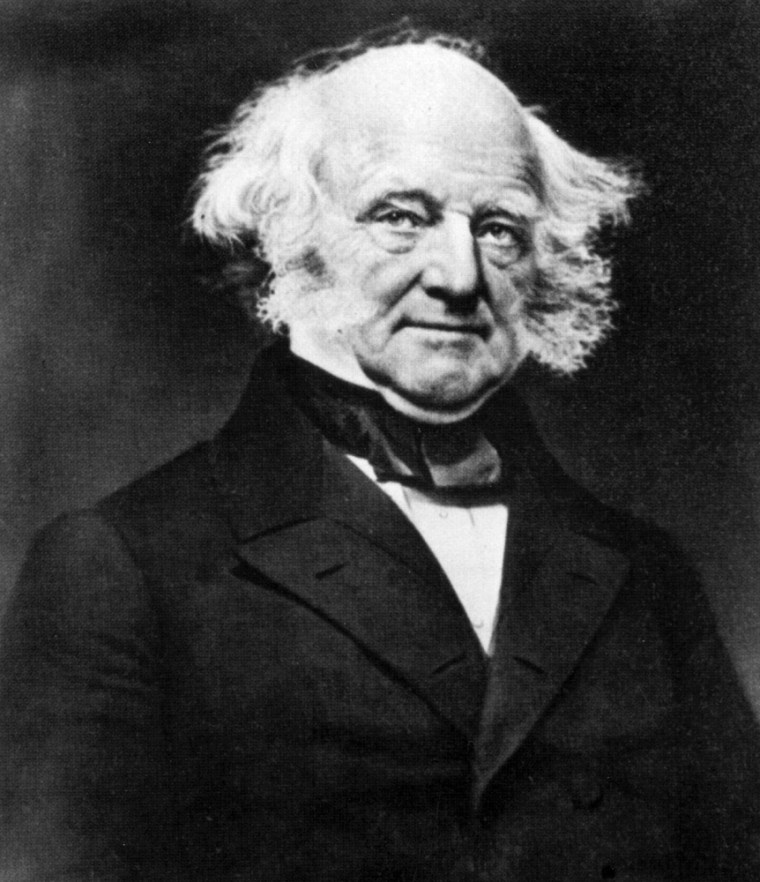President Martin Van Buren didn't have MP3s. Or CDs. Or, for that matter, popular bands with wide radio play whose songs he could sample at rallies. This was, after all, 1840.
What Van Buren did have at his disposal in his re-election bid was a well-known lullaby called "Rockabye Baby." And so it was recruited as an innovative, if awkward, musical attack ad against his Whig opponents, "hard cider" candidates William Henry "Old Tippecanoe" Harrison and John Tyler.
"Rockabye Baby, Daddy's a Whig. When he comes home, hard cider he'll swig," the song went. "When he has swug, he'll fall in a stew, and down will come Tyler and Tippecanoe."
Through the 19th century and a chunk of the 20th, before popular recorded music became available to the masses, presidential campaign songs were one of two things — original compositions or bastardizations of existing tunes salted with new lyrics that fit the volatile political climate.
With few exceptions, both approaches were pretty clunky. But they got messages across and generated enthusiasm in eras when the only music you had was what you sang yourself.
"The public does not want a poet," says Oscar Brand, one of America's elder-statesman folk singers. His album, "Presidential Campaign Songs, 1789-1996," chronicles a crazy-quilt tapestry of political hucksterism, regional divisions, national optimism and the beginnings of advertising culture.
At 88, Brand is still singing. A recent visit to his Long Island home found him surrounded by music books and instruments, and ready to break into song at a moment's notice. Which he does.
From his guitar and mouth comes a familiar tune. It SOUNDS like Yankee Doodle, but with some key changes it becomes a campaign song for Harrison and Tyler in 1840.
Or consider "Adams and Liberty," an ode to the second president that was used in John Adams' 1800 re-election campaign against Thomas Jefferson. It was written to the tune of a well-known song called "To Anacreon in Heaven," and it takes until the chorus before it suddenly hits you: This is the melody that, 14 years later, would be used by Francis Scott Key to carry the words of what would become "The Star-Spangled Banner."
Most of yesteryear's campaign songs aren't quite so saturated in grandeur. Benjamin Harrison's supporters sang a song whose first verse went, "What's the matter with Harrison — he's all right." Talk about damning with faint praise. And the notoriously corpulent William Howard Taft couldn't have been entirely pleased that his partisans were singing a song called "Get on a Raft with Taft."
"The things that are associated with you can be deadly or can be very useful," Brand says, pausing from singing. "If it has an air to it that seems to represent the man who's running ... it works."
Even if it's clumsy and graceless. Nine years before the Civil War, for example, Millard Fillmore won with the help of the apparently original composition "The Union Wagon":
"The Union is our wagon, the people are its springs and every true American/for Millard Fillmore sings."
Even then, that was probably not the case.
Lest you think that the awkwardness of campaign music ebbed as our era approached, consider the random sultry woman in the cocktail dress who appeared to the few Americans watching TV in the autumn of 1952 and sang a jaunty ode to Democratic presidential contender Adlai Stevenson, the governor of Illinois.
It was called "I Love the Guv," and it was not the smoothest of musical efforts — unless, of course, you're into the postwar toothpaste-commercial aesthetic.
Suffice it to reveal that she rhymed "Adlai" with "I Love You Madly." Almost makes you long for the days of a bastardized "Rockabye Baby."
